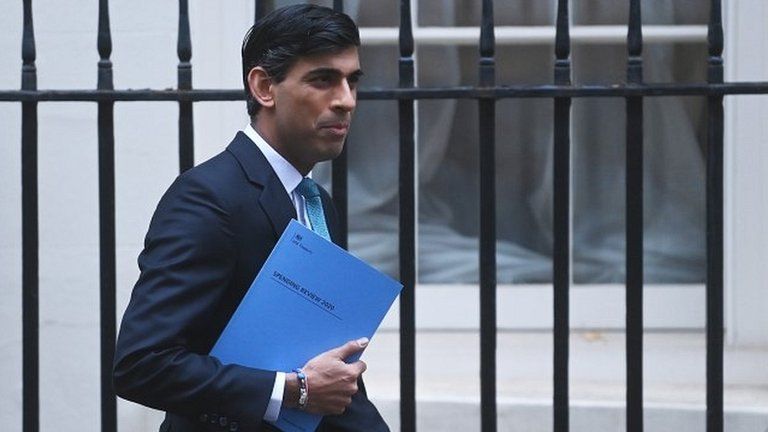Spending Review: Rishi Sunak grapples with a political paradox
- Published

On rare occasions, nervous chancellors leave No 11 Downing Street gripping their documents and deliver news to the country that resets the dial.
That happened on Wednesday.
The pandemic has already cost jobs and created hardships, but there can now be no doubt that the economic aftermath of the disease we hadn't even heard of twelve months ago will last for many years.
The predictions of job losses, record levels of borrowing and debt are all huge headlines in themselves.
In the last few months, with almost no dissent, the government has scrambled to expand the state to help cope with coronavirus.
Borrowing rates are at rock bottom. Other countries have done the same. There is little controversy about the decisions that have been taken so far.
But what lurks on the country's balance sheet is the biggest economic baggage for generations.
There is almost zero political pressure to solve the problem any time soon.
But the enormous debts that have been racked up for good reasons leave us vulnerable to tiny changes in interest rates that the government can't control. (The new boss of the Office for Budget Responsibility has a really clear explanation of all this on tonight's Newscast, that you can listen to here)
Whether by necessity or not, eventually the situation is likely to force a reckoning in the Tory party whose guiding principles include taxing, borrowing, and spending less.
It's a Conservative chancellor whose instinct is to pare back the state but who has presided over a generational emergency expansion.
How Rishi Sunak and Boris Johnson propose to solve that paradox will create the contours of political arguments at least until the next election.
If you were looking for political signals as to the path they might want to take, you might still be guessing, with messages that pull in different directions.
Certainly the cut to international aid spending had triggered a row in advance that will rumble on for some time.
Tories who were at the top of the party in the Cameron era are furious while others think it's about time. Although by breaking a manifesto commitment like this, the chancellor has set a precedent even supportive MPs may come to regret.
But there was some new spending too, for example a £4bn fund that local MPs can bid for for projects to help their areas - a down payment on keeping promises made to newly Tory seats.
The public sector pay freeze will be painful of course for the 1.3 million staff who will be affected and will enrage the opposition and the unions.
But it is less drastic than the limits announced by George Osborne in 2010.
Overall public spending will still go up, but day-to-day spending in government departments is going to be under a huge amount of pressure.
There is some evidence of shifting priorities, but the reality of how the chancellor might try to bring the economy back to anything even vaguely approaching a normal balance is far from clear.
Today we have learnt a lot about the scale of the economic problem they and successive governments will have to grapple with.
Towards the end of his speech, the chancellor appeared to be channelling Margaret Thatcher and one of the former PM's most famous statements about society. when he emphasised the importance of community and family.
But despite that brief rhetorical echo of Mrs Thatcher, we have learnt precious little about what Mr Sunak sees as potential solutions.
Like it or not, through the pandemic we have witnessed a rapid expansion in the size of the state, with a Conservative government at its helm.
Clues about if, let alone when, that will end are tonight, in short supply.
- Published24 November 2020
- Published25 November 2020